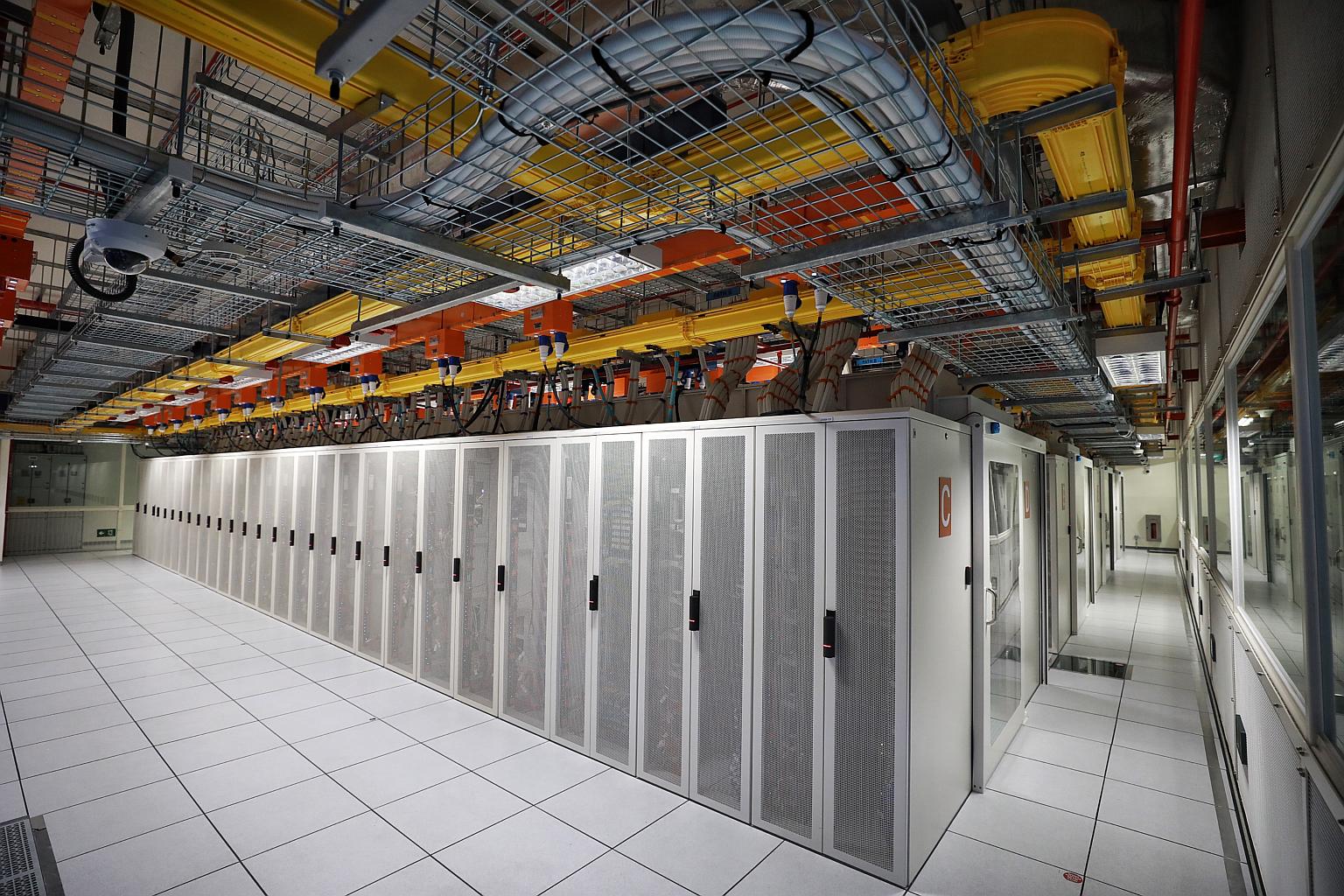Data centre rents in S'pore set to keep rising amid high demand, limited supply
Sign up now: Get ST's newsletters delivered to your inbox

The rise in rent is due to demand from network and IT services, followed closely by the growth of hyperscalers.
ST PHOTO: KEVIN LIM
SINGAPORE - The amount firms pay for data centre space is expected to keep rising in Singapore due to strong demand and limited availability, according to a report by real estate consultancy Colliers.
It said data centre rent will rise at an average of around 3 per cent annually, with retail co-location leases expected to increase the most due to limited supply and rising energy costs.
A co-location data centre is a facility that has been sub-leased by multiple IT tenants.
In Singapore, retail co-location leases have energy requirements below 500 kilowatts (KW).
Colliers said that co-location data centres provide around 6.5 per cent return as compared to prime retail assets such as shopping malls and retail shops, where the return is around 4.5 per cent.
The rise in rent is due to demand from network and IT services, followed closely by the growth of hyperscalers, which are large companies like Google, Amazon and Meta.
The ongoing shift to hybrid working and business digitalisation has also contributed to the demand for data centre space.
Demand is expected to remain high with the rapid growth of crypto-trading and blockchain activities, online gaming and the Metaverse.
In its June 28 report, Colliers said that Singapore is the second largest data centre hub in Asia-Pacific after Tokyo.
According to the Ministry for Trade and Industry, there are more than 70 operational data centres in Singapore with a total available IT capacity of about 1,000 MW as of last year.
Singapore's data centre investment turnover was $397.82 million in 2021, 1.85 times the volume of the previous year, according to the report.
Colliers noted that the Covid-19 pandemic caused delays in the construction of new data centres.
But it added that more data centre power supply is expected to come onto the market this year.
This will moderate in 2023 when supply is regulated at a cap of 60 megawatts (MW) per year, in line with Singapore's climate change commitments of halving carbon emissions by 2050.
Data centres are energy-intensive assets, and according to the South-east Asia's Green Economy report, they will account for 12 per cent of Singapore's consumption by 2030.
The 2021 report was a collaboration of management consulting firm Bain and Company, Singapore's investment company Temasek and Microsoft.
Mr Lynus Pook, executive director and head of industrial services in Singapore at Colliers, said industry players must contend with higher standards as Singapore aims to further reduce its emissions intensity to address climate change.
He added that only the most sustainable data centres will thrive.
"As such, it is imperative for industry players to make a conscientious effort to design and implement energy-efficient solutions to successfully navigate the stringent guidelines," said Mr Pook.
He added that industry players need to partner with a dedicated operator or enlist an advisor with demonstrated data centre expertise to compete efficiently in Singapore.

Keppel, which owns and operates six data centres here, is working with the data centre industry and the Singapore government to aggregate demand into a data park in order to provide sufficient economies of scale to accelerate green energy and hydrogen adoption in Singapore.
This comes on top of the company’s efforts to incorporate a sustainability strategy, which includes exploring innovative technology related to floating data centres, and adopting stringent energy conservation best practices to optimise energy and water efficiency, among others, said Mr Wong Wai Meng, the chief executive of Keppel Data Centres.
“We have seen strong demand for data centre capacity in Singapore and this is a trend that we expect to continue on the back of increasing digitalisation and technological adoption by businesses and organisations, coupled with the tight supply of data centres,” he said.
The rise in demand comes as the lifting of a two-year moratorium, put in place in 2019, draws closer.
Under the moratorium, development of new data centres on existing state land and release of state land for data centres was temporarily paused to moderate the growth of data centres.
The Government earlier this year said it will begin accepting applications for a new pilot project of data centre developments with improved environmental conditions from the second quarter of the year.
During this pilot phase of 12 to 18 months, the total capacity allocated for new data centres applications will be capped at 60 MW and allocated to a maximum of three operators.


